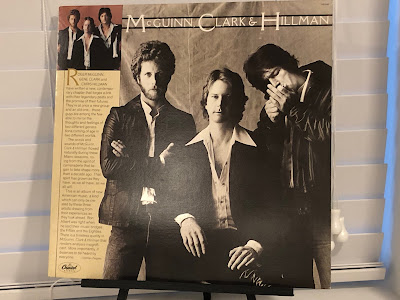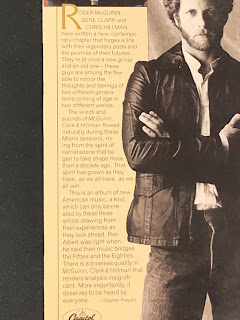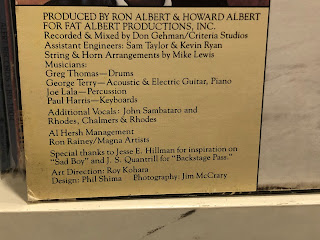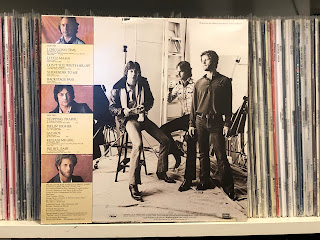Now, I'm a casual fan of The Byrds, and I enjoy most of what I've heard over the years - except for "8 Miles High" yeah, it's a classic, but for goodness sake Roger McGuin spent most of the song trying to get his fingers untangled from the 12 strings on his Rickenbacker. It may be a cacophonic masterpiece to some, but to me it's a reminder that not everyone can play lead guitar.
As a casual fan I knew that Chris Hillman and Roger McGuinn were former Byrds, but didn't know that Gene Clark was as well. Turns out here were three of the original five members of the band. I guess Capitol figured if a bird in hand was worth two in the bush, three in hand would equal a nice shrubbery ... maybe even two with a little path running down the middle. The only issue was Roger the shrubber didn't contribute a lot in the way of songwriting on the album. Although what he did write was pretty good.This is a decent sounding record but there's really nothing that seems equal to the talents of the three Byrds in hand. It's a strange thing as the guys were still in their '30s and they were still relatively young men, and there were hopes that they'd be able to be the bridge between different generations.
The singles that were pulled from the album though were catchy enough. The Roger McGuinn penned "Don't You Write Her Off" was good, and it actually cracked the top 40. The other song I really liked was the Rick Vito song "Surrender to Me" but it didn't chart, but should have. The album closes with the second of the McGuinn compositions, "Bye Bye, Baby" a song that actually hearkens back to their golden age. It is a beautiful song, and everyone seems to be in sync.
The production team of Ron Albert and Howard Albert who had produced Crosby, Stills & Nash's 1977 album CSN were tapped to bring the magic to another classic trio. I suppose the logic was if CSN could make a comeback and sell 4,000,000 records and they only had one former Byrd, imagine what three could do?
Side note: Okay, I've scanned through what I've gotten down so far and it seems like I've kind of beaten the three Byrds thing pretty much to death. I thought it was fun the first time, but I guess a few times too many to the bird bath for me ... so I'll stop.I imagine the folks at Capital were expecting big things as well. The '70s were still alive and well and there was a good chance that with a little luck a nicely polished collection of soft rock songs with some backing pedigree could be a wonderful thing. After all the label even went so far as to put a small essay by Stephen Peeples extolling the virtues of the album on the cover of the album.
It was a lot of extended hyperbole that even Don Draper would have had a hard time topping:
There is a timeless quality in McGuinn, Clark & Hillman that renders analysis insignificant. More importantly, it deserves to be heard by everyone.
As history would have it, this mini reunion would be short lived. The album was not heard by everyone, and although there was some success - enough to warrant another kick at the can. Gene Clark who had his share of demons would largely be absent from the band's follow up a year later, and a final album simply credited to McGuinn/Hillman was released in 1980, that by all accounts was a contractual obligation effort. Shortly after tensions between the two would spell the end of their partnership.



Comments
Post a Comment